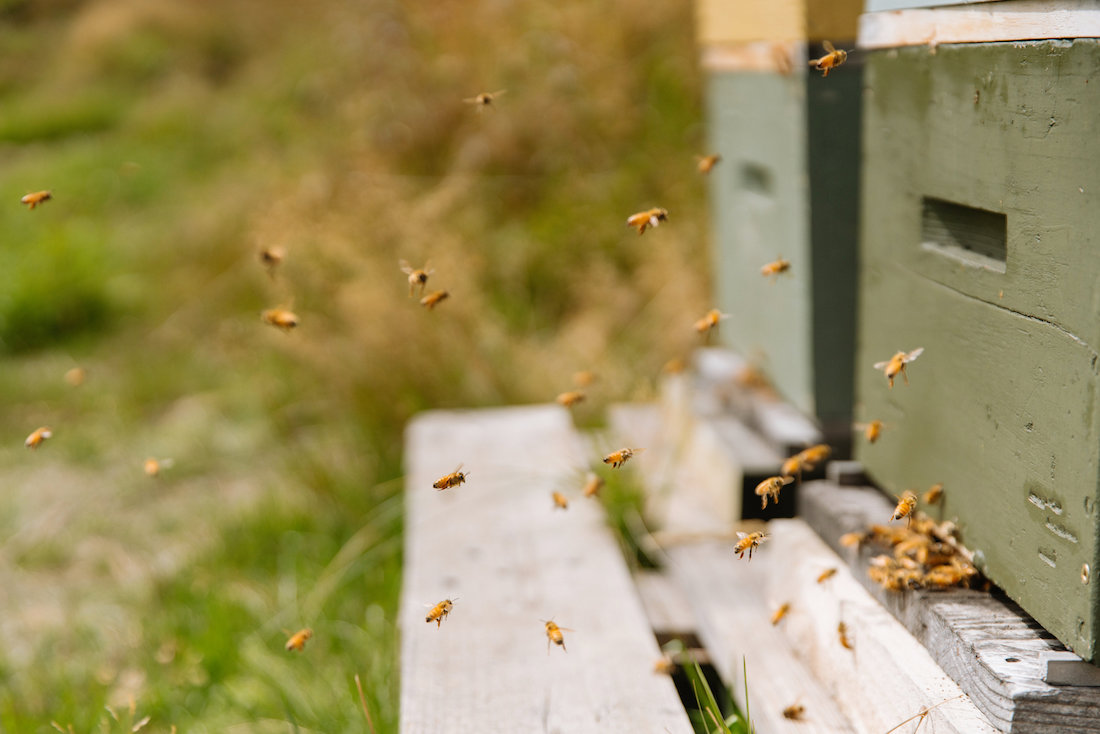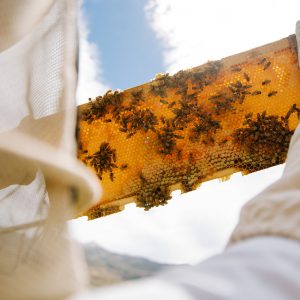If your only encounter with bees has been on the wrong side of a stinger, allow me to introduce you to these creatures, Planet Earth style. Honey bees never sleep, have hair on their eyes, build perfect hexagons, and can reverse their brain aging when taking on the jobs of younger bees. They study angles of the sun to find where the good pollen is and they communicate through competitive dance routines.
Bees are fascinating and one in every three bites of food depends on bee pollination, which makes the fact they are disappearing an even harder pill to swallow. Around the world, honeybee population loss has been swift and devastating, attributed to everything from pesticides to phone signals. But the root cause of their disappearance is also the most obvious: our climate is changing and we’re frantically trying to slap Band-Aids of synthetic fertilizers, herbicides, mutant vegetables and antibiotics on the problem.
To be an advocate for climate change policy is to be an advocate for local, chemical-free farming. In his book Oil and Honey, 350.org founder Bill McKibben explains that due to the rapid rate at which our planet is heating up, currently one degree hotter than average globally and locked into at least another half-degree increase, we need immediate and global political action to have any real chance of slowing things down. But even if we do figure out this conundrum, we’ll need larger and lasting cultural shifts returning to more sustainable norms. Growing and buying our food locally will be one of the most important.
Step one: get a new generation of young people interesting in farming, which is easier said than done. Traditional farming is laborious, demanding, not all that profitable, and dictated by increasingly erratic weather patterns and access to large plots of fertile land. As an industry, it’s not as sexy as tech or fashion, either. But the times they are a-changing, and so is farming.
In what sounds a little like science fiction, the startup Plenty opened a farm last year just south of Seattle growing fruits and vegetables for regional customers in climate and light controlled 20-foot cylinders, which are totally herbicide, pesticide and GMO free. Plenty scored $200 million from investors in the largest ag-tech deal ever. This method of vertical farming joins a new wave of agriculture helping to disrupt the industry, such as urban and suburban rooftop and compact farming. This wave is just the start and may all come back to bees.
In 2014, Flow’s honey-on-tap bee hives went live on Indiegogo and started garnering attention online, piquing the interest of Santa Cruz native Travis Oberg. He did some research, purchased a hive, and began keeping bees. This led to a bee-friendly garden and three years later, he and his wife run California Honeycraft, which sells organic honey and beeswax products to local customers.
“As a beekeeper, you’re aware of the seasons, the rise and fall of bee colony populations, and that interdependency with the environment,” Oberg explains. “It’s all about sustainability. Being a beekeeper means finding a balance in letting an organism thrive within its environment and the interaction we have with it.”
Salt Lake City resident Adam Buchanan is another proponent of the practice, who realized the potential of beekeeping reached beyond their obvious product. “Our main reason for keeping bees in the beginning was honey, but then we realized the pollination was incredible and our garden exploded. We’ve recruited 20-plus beekeepers over the years, and have shared why it’s important to avoid using harmful chemicals like RoundUp in our landscaping.”
Bees are fairly self-sufficient and it doesn’t take much time or financial investment to get started. With a low barrier to entry, could beekeeping be a “gateway drug” to other forms of agriculture? Could it be indicative of the first steps toward that culture shift? Maybe. At the very least, it’s another way to spend some time outdoors for the next generation.
“Beekeeping made me think more about the decisions I make and their lasting consequences,” says 18-year-old Tauni Keyes, who has been keeping bees for four years. “The planet—my bees included—depends on people like me to step up and do my part.”
Images by Greg Balkin.
xx Johnie Gall
This article was originally published in RANGE Magazine Issue Nine.


